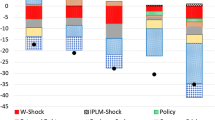Abstract
This paper examines the possibility that, contrary to conventional wisdom, capital controls accelerate currency crises. Theoretical analysis shows that capital controls can constitute an additional burden on government budget and so bring forward the onset of crises. Since perfect capital mobility does not occur, domestic interest rates may deviate from world interest rates. High interest rates under capital controls create an additional cost of servicing outstanding domestic public debt, precipitating crises. Even though the government can delay crises with capital controls, welfare may be less than in a situation with perfect capital mobility.
Similar content being viewed by others
References
Ariyoshi, A., Habermeier, K., Laurens, B., Otker-Robe, I., Canales-Kriljenko, J. I., and Kirilenko, A. (2000): ``Capital Controls: Country Experiences with Their Use and Liberalization''. IMF Occasional Paper No. 190.
L. Auernheimer (1987) ArticleTitleOn the Outcome of Inconsistent Programs under Exchange Rate and Monetary Rules Journal of Monetary Economics 19 279–305 Occurrence Handle10.1016/0304-3932(87)90050-X
P. Bacchetta (1990) ArticleTitleTemporary Capital Controls in a Balance-of-Payments Crisis Journal of International Money and Finance 9 246–356 Occurrence Handle10.1016/0261-5606(90)90008-N
L. Bartolini A. Drazen (1997) ArticleTitleCapital-account Liberalization as a Signal American Economic Review 87 138–154
O. Blanchard (1985) ArticleTitleDebt, Deficits and Finite Horizons Journal of Political Economy 93 223–247 Occurrence Handle10.1086/261297
M. Bordo B. Eichengreen D. Klingebiel M. S. MartinezPeria (2001) ArticleTitleIs the Crisis Problem Growing More Severe? Economic Policy 16 51–82 Occurrence Handle10.1111/1468-0327.00070
C. Burnside M. Eichenbaum S. Rebelo (2001) ArticleTitleProspective Deficits and the Asian Currency Crisis Journal of Political Economy 109 1155–1197 Occurrence Handle10.1086/323271
C. Burnside M. Eichenbaum S. Rebelo (2006) ArticleTitleGovernment Finance in the Wake of Currency Crises Journal of Monetary Economics 53 401–440 Occurrence Handle10.1016/j.jmoneco.2005.03.012
Calvo, G. A. (1987a): “Balance of Payments Crises in a Cash-in-Advance Economy”. Journal of Money, Credit and Banking 19: 19–32.
Calvo, G. A. (1987b): “On the Costs of Temporary Policy”. Journal of Development Economics 27: 245–261.
G. A. Calvo (1989) ArticleTitleAnticipated Devaluations International Economic Review 30 587–606 Occurrence Handle10.2307/2526777
G. A. Calvo C. M. Reinhart C. A. Végh (1995) ArticleTitleTargeting the Real Exchange Rate: Theory and Evidence Journal of Development Economics 47 97–133 Occurrence Handle10.1016/0304-3878(95)00006-2
Cooper, R. N., (1998): “Should Capital-account Convertibility be a World Objective?” In Should the IMF Pursue Capital-account Convertibility? edited by Stanley Fischer et al. Essays in International Finance No. 207, International Finance Section, Department of Economics, Princeton University.
G. Corsetti B. Maćkowiak (2006) ArticleTitleFiscal Imbalances and the Dynamics of Currency Crises European Economic Review 50 1317–1338 Occurrence Handle10.1016/j.euroecorev.2005.02.005
B. C. Daniel (2001) ArticleTitleA Fiscal Theory of Currency Crises International Economic Review 42 969–988 Occurrence Handle10.1111/1468-2354.00142
H. Dellas A. Stockman (1993) ArticleTitleSelf-fulfilling Expectations, Speculative Attack, and Capital Controls Journal of Money, Credit, and Banking 25 721–730 Occurrence Handle10.2307/2077801
M. P. Dooley (1996) ArticleTitleA Survey of Literature on Controls over International Capital Transactions IMF Staff Papers 43 639–687
A. Drazen E. Helpman (1987) ArticleTitleStabilization with Exchange Rate Management Quarterly Journal of Economics 102 835–856 Occurrence Handle10.2307/1884284
B. Eichengreen H. Voth (2003) ArticleTitleSymposium on Capital Controls International Journal of Finance and Economics 8 185–187 Occurrence Handle10.1002/ijfe.206
R. C. Feenstra (1986) ArticleTitleFunctional Equivalence between Liquidity Costs and the Utility of Money Journal of Monetary Economics 17 271–291 Occurrence Handle10.1016/0304-3932(86)90032-2
K. J. Forbes (2005) The Microeconomic Evidence on Capital Controls: No Free Lunch S. Edwards (Eds) Capital Controls and Capital Flows in Emerging Economies: Policies, Practices and Consequences University of Chicago Press Chicago
Glick, R., and Hutchison, M. (2000): ``Capital Controls and Exchange Rate Instability in Developing Economies''. Pacific Basin Working Paper PB00-05, Federal Reserve Bank of San Francisco.
P. E. Guidotti C. A. Végh (1992) ArticleTitleMacroeconomic Interdependence under Capital Controls: a Two-country Model of Dual Exchange Rates Journal of International Economics 32 353–367 Occurrence Handle10.1016/0022-1996(92)90025-F
Hood, R. (2001): ``Malaysian Capital Controls''. World Bank Policy Research Working Paper No. 2536.
P. Krugman (1979) ArticleTitleA Model of Balance-of-Payments Crises Journal of Money, Credit and Banking 11 311–325 Occurrence Handle10.2307/1991793
A. Lahiri C. A. Végh (2002) Living with the Fear of Floating: An Optimal Policy Perspective S. Edwards J. Frankel (Eds) Preventing Currency Crises in Emerging Markets University of Chicago Press Chicago
A. Lahiri C. A. Végh (2003) ArticleTitleDelaying the Inevitable: Interest Rate Defense and BOP Crises Journal of Political Economy 111 404–424 Occurrence Handle10.1086/367682
D. Leblang (2003) ArticleTitleTo Defend or to Devalue: The Political Economy of Exchange Rate Policy International Studies Quarterly 47 533–559 Occurrence Handle10.1046/j.0020-8833.2003.00278.x
R. E. Lucas SuffixJr. (1993) On the Welfare Costs of Inflation University of Chicago Mimeo
B. T. McCallum M. S. Goodfriend (1987) Demand for Money: Theoretical Studies J. Eatwell M. Milgater P. Newman (Eds) The New Palgrave: A Dictionary of Economics Stockton Press New York 775–781
M. Obstfeld (1986) ArticleTitleCapital Controls, the Dual Exchange Rate, and Devaluation Journal of International Economics 20 1–20 Occurrence Handle10.1016/0022-1996(86)90058-9
Park, D., and Sachs, J. (1987): ``Capital Controls and the Timing of Exchange Regime Collapse''. NBER Working Paper No. 2250.
Rodrik, D. (1998): ``Who Needs Capital-account Convertibility?'' In Should the IMF Pursue Capital-account Convertibility? edited by Stanley Fischer et al. Essays in International Finance No. 207, International Finance Section, Department of Economics, Princeton University.
J. E. Stiglitz (2002) Globalization and its Discontents W.W. Norton New York
E. Talvi (1997) ArticleTitleExchange Rate-based Stabilization with Endogenous Fiscal Response Journal of Development Economics 54 59–75 Occurrence Handle10.1016/S0304-3878(97)00029-1
S. Wijnbergen ParticleVan (1991) ArticleTitleFiscal Deficits, Exchange Rate Crises and Inflation Review of Economic Studies 58 81–92 Occurrence Handle10.2307/2298046
Végh, C. A. (2001): ``Monetary Policy, Interest Rate Rules, and Inflation Targeting: Some Basic Equivalences''. NBER Working Paper No. 8684.
World Bank (2000): Global Development Finance: Analysis and Summary Tables. Washington, DC: The World Bank.
C. Wyplosz (1986) ArticleTitleCapital Controls and Balance of Payments Crises Journal of International Money and Finance 5 167–179 Occurrence Handle10.1016/0261-5606(86)90040-9
Author information
Authors and Affiliations
Corresponding author
Rights and permissions
About this article
Cite this article
Kitano, S. Capital Controls, Public Debt and Currency Crises. J Econ 90, 117–142 (2007). https://doi.org/10.1007/s00712-006-0227-1
Received:
Revised:
Published:
Issue Date:
DOI: https://doi.org/10.1007/s00712-006-0227-1




